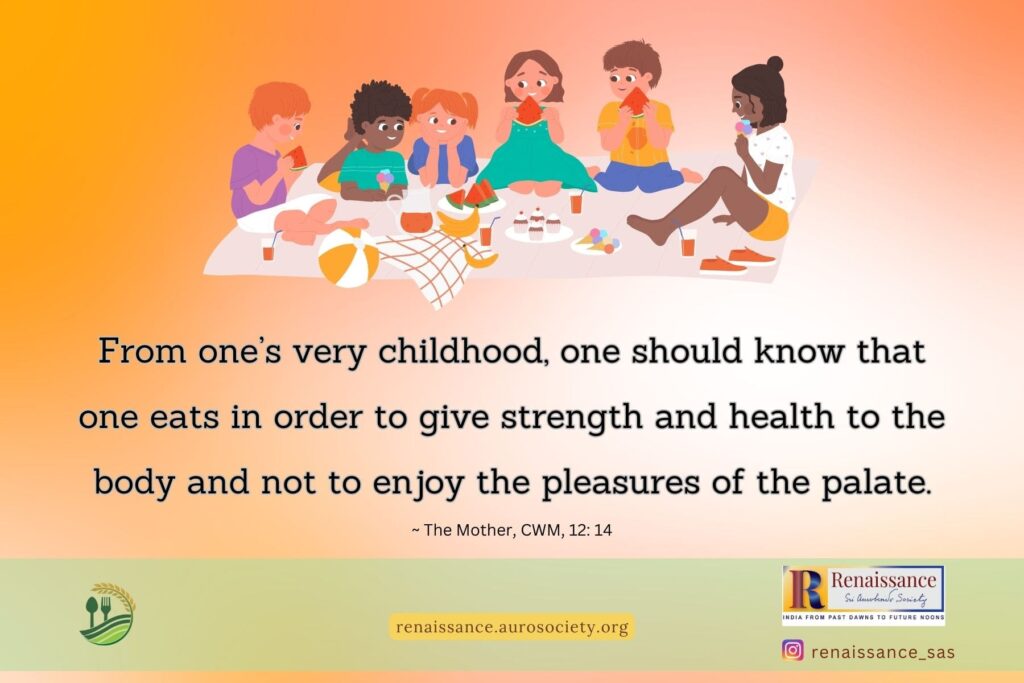Volume II, Issue 7
Author: Dr. Rajeshwari
Continued from Part 6
Though the incident I am about to narrate occurred over two decades back, it is still fresh in my memory.
It is about a family in one of the remote villages I used to visit. It was a large family, which consisted of several elders. The grandparents aged 80 and 71 were revered for their folk wisdom, which they had imbibed in turn from their elders. They dealt with common health issues of the family by suggesting indigenous remedies and common sense solutions. Even in medical emergencies, they managed to provide first aid before doctors were called in. Most of the time the medical personnel looked on with disbelief at the effective aid that had already been given, but nevertheless argued against it as being crude and made money out of the situation.
Moderns have not the solid nervous system and the natural (as opposed to the artificial and morbid) zest of life that their ancestors had.
~ Sri Aurobindo, CWSA, Vol. 31, p. 587
The boy I had mentioned in my previous article belonged to this family. A student of class 8, he was not only intelligent, but also respectful towards elders, particularly his grandparents whom he admired for their native wisdom. He was curious as to how they knew so much, without ever having gone to school or attended any adult education classes. He asked intelligent questions and his grandparents were also eager to explain things in detail to him.
The first time I went to their house, he was asking his grandfather why his grandmother was giving contradictory orders about picking up a crying baby. “She asked me to cover the baby’s ears yesterday when he was crying. This morning she made my mother pick him up when he was crying. And now, she is saying, ‘Let him cry for a while and that it is good for the baby to cry.’”
Clearly the boy was puzzled. And I am sure, so are you.

There is no inconsistency here, but a deep understanding of the nature of the bhūtas, which must be rightly appreciated. That there is scientific basis for the seemingly contradictory advise given by the grandmother can be seen from the explanation the proud grandfather gave the boy. But that will have to wait a bit.
Internal Balance of Five Elements
As mentioned in earlier parts of this series, our body is a micro-universe with all the five elements or panća bhūtas residing in it. Just as their balance in the outer Universe is vital for the well-being of our planet, the internal balance is also necessary for health and well-being of individuals.
We saw in the previous article, how our elders took the help of sound to counter the effect of Vāyu entering the body through the ear. They also knew that they had another ally in the form of water with which to reduce the ill-effects of wind in the body. This can be best illustrated by an infant’s crying and how our elders dealt with it to safeguard the panća bhūtas inside the baby’s body and prevent harm to its tender internal organs.
When we open our mouth to speak, cry, shout or sing, the exhaled air caresses the vocal cords to produce the sound. While we are doing any of these acts, we cannot inhale through the nostrils. (Go on, try it out!) When the Vāyu with all good and noxious gases finds an open mouth, it gleefully enters freely through it into the body, without getting even partially purified by the filters of the nose. Once inside, it wanders at will, while simultaneously blocking the entry to the nose and ears.
Adults might become aware of the situation and try to remedy it, by starting to breathe through the nose. But a wailing infant is incapable of fully stopping the entry of the wind through the mouth, though sound helps to some extent. That is why elderly women will not allow the infant to cry for long, but will immediately lift and cradle it in their arms thus covering and protecting the ears of the child from the double attack of the wind.
However, when the infant cries for a prolonged time, its eyes begin watering. This is the additional effort of the water element to prevent the harm caused by the wind. When they notice the tears, elders would advise: ‘Let it cry for some time, it is good for the baby.’ The saying ‘Baalaanaam rodanam balam,’ which means ‘wailing is the strength of the babies,’ bears out this scientific fact.
Can Tears Help a Baby?

Let me now come to the grandfather’s explanation given to his grandson about the science behind grandmother’s contrary advice in dealing with a crying baby.
Like the other two sensory organs — nose and ears — our eyes too suffer the effect of abundant unfiltered Vāyu striking it. In order to counter the wind, the tear glands release a large amount of water in the form of tears.
When the eyes begin watering, the water element helps in two ways: firstly, it gets rid of the polluted water caused by the powerful wind, escaping through the tears. (The tears taste salty indicating the pollution in the water). Secondly, the power of the wind is reduced by the tears.
If a crying infant continues to wail without shedding any tears, and there is no one around to lift it, some elder in the house would ask an older child to cover the ears of the child gently. This is to protect the very tender eardrums and prevent deafness in the child. You would have noticed that the infant waves its arms and kicks its legs while crying. These actions help relieve the Vāyu that has also entered the muscles and joints, when it gained free entry through the mouth.
When older children throw a tantrum, they mostly open their mouth and cry. The loud sound pushes the wind further inside. Usually children and infants cry in this manner. In order to fight the wind that rushes in through the open mouth, water comes to the aid in the form of tears from the eyes and saliva from the mouth. Sometimes the nose begins running too, adding to the quantity of water discharged.
But when elders, especially women cry or sob, they suppress the sound by burying their face in their pallu or in a pillow. Since a large quantity of water needs to be let out, water rushes out of not just the eyes, but also the nose.
The three elements wind, fire, and water, which regulate the trídośas (vāta, pitta, kapha) in the body have their own balancing mechanism. If one of them becomes aggressive, the other two try to do their bit by taming the element that has gone wild, thus ultimately helping humans.
Likewise, our ancestors understood the concept of the dominant and passive bhūtas within and outside the body, and used the knowledge to handle situations of any nature to restore and maintain good health.
Can Wind Help Hard of Hearing Elders?
The boy listened intently and was quiet for a while before coming up with another question. This time it had to do with the hearing problems of some of the elders in the family. Some were partially deaf and others, totally deaf. He wanted to know why they asked him and others to come close and speak loudly and still complained that they couldn’t hear anything?

The grandfather loved such questions from the boy. He was convinced that one day his grandson would be the elder of the next generation, and be able to guide people on preventive health with his wisdom! He then explained the sound and wind theory to the eager boy.
When we speak, the air we exhale comes first, followed by the voice. So, if one goes very close to the ear of the deaf person and speaks, the exhaled wind enters and blocks the entry of the voice that follows it, with the result that they can’t hear anything.
If you feel that cupping your hands near the deaf person’s ear before speaking might help, it does not. It actually makes it worse, for the cupped hands push the dense air we breathe out right into their ear. At least outside air has oxygen, but the exhaled being full of carbon-dioxide is very dense. This makes it impossible for sound to enter the ear, thus effectively blocking the voice from being heard.
The boy now understood the problem the elders faced. But he still had another question: “Why was it that some voices were heard clearly by these elders even if spoken from a distance, while others were not audible?”
“That is because the pitch of their voice is either shrill or they are speaking at the top of their voices,” replied the grandfather. “The wind carries the sound to their ears and does not block it, as it does when one is very close to the ear,” he added.
“This is the reason why sounds in the high octaves — a doorbell, buzzer or someone shrieking even at a great distance — can always be heard clearly by the deaf,” the grandfather further explained, patting his grandson indulgently.
This is how our elders intelligently and ingeniously dealt with the problems caused by the imbalance of the five elements within our body. So the next time you are faced with communicating with someone who is hard of hearing, don’t forget to employ the above bit of folk wisdom! Use the power of wind.




